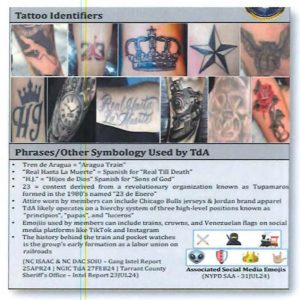
Last week, U.S. law enforcement agencies made a surprising claim: certain emojis being used on social media might be secret symbols linked to Tren de Aragua (TdA), a Venezuelan gang. This theory appeared in official briefings, training documents, and reports shared among officers from the FBI, Customs and Border Protection (CBP), the U.S. Army, and the New York Police Department (NYPD). These agencies suggested that emojis like trains, crowns, ninjas, swords, aliens, and even strawberries could act as coded gang signs.
Train of Aragua
The reasoning behind this claim is tied to the gang’s name, Tren de Aragua, which translates to “the train of Aragua.” Officials argued that the train emoji is an obvious reference to this group. Alongside the train, the lists included symbols like crowns, which might suggest rank or power; ninjas and swords, representing fighting or stealth; aliens, potentially hinting at being outsiders; and even strawberries, though what it means in this context wasn’t clearly explained. These emojis were said to be used by people showing loyalty or connection to the gang, especially on popular platforms like Instagram and TikTok. I see no red heart emojis.
Emojis to Communicate
The NYPD’s intelligence documents warned that members of TdA in New York City use these emojis to secretly communicate and mask their identities. They also mentioned that TdA members use slang from South America and Arabic words online to hide who they are. One official report distributed across law enforcement highlighted emojis like the alien face, shield, crown, hand making the rocker gesture, swords, ninja, and train as “symbols, iconography and signs” connected to the gang.
View this post on Instagram
However, experts have raised serious doubts about these claims. Andrés Antillano, a criminology professor in Venezuela, said these connections are “totally false.” He explained that Tren de Aragua does not have a clear, organized structure in the U.S. and that these emojis are just regular language used by many young people. The popular emojis pointed out by authorities are widely used across social media for fun, style, or expression, with no real gang meaning.
![]()
Alien Enemies Act
Critics also emphasize the danger of this kind of interpretation. Using emojis—which are common and often playful symbols—as evidence of gang affiliation risks wrongly labeling innocent people as criminals. This is especially worrying given the harsh legal consequences that can follow, such as deportation without the usual legal protections under the Alien Enemies Act. In the past, tattoos were similarly misused in immigration cases to justify deportations — even when those tattoos had no real link to crime or gangs.
The FBI’s list of emojis associated with Tren de Aragua was slightly different from the NYPD’s. It included pictures of buildings and strawberries, but the FBI did not explain what these symbols supposedly meant. This lack of clarity adds to concerns that authorities are making broad, unfounded assumptions about harmless symbols.
Police claim that TDA members can be identified through emojis is ‘an unsophisticated, uneducated approach that demonstrates a lack of knowledge’.https://t.co/jq5DnaJd0V
— Rebecca Hanson (@BeccaAnnice) September 19, 2025
Racial Profiling
Gang experts, immigration lawyers, and human rights advocates have called the idea “ludicrous,” “uneducated,” and “baseless.” They warn that this error in judgement could deepen racial profiling and lead to unfair targeting of young Hispanic and Latino people who use emojis as part of everyday online conversations.

In summary, while law enforcement agencies are concerned about gang violence, many believe the link between certain emojis and Tren de Aragua is built on shaky ground. These emojis are part of normal, widespread digital culture and do not carry clear criminal meanings. Treating them as gang signs risks misunderstanding social media language and punishing people for innocent online behavior.


